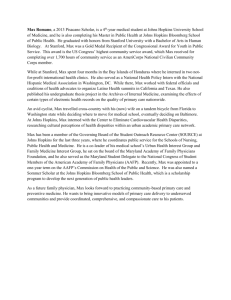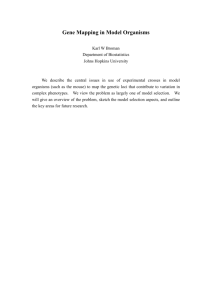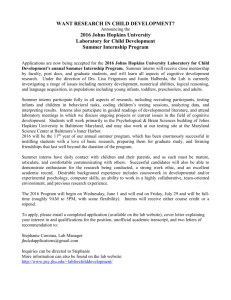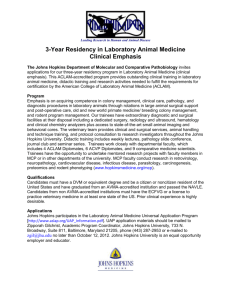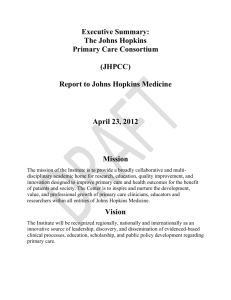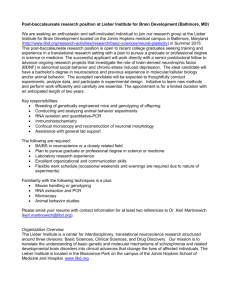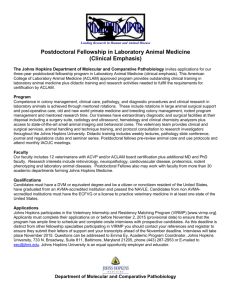Johns Hopkins Technology Ventures Article
advertisement
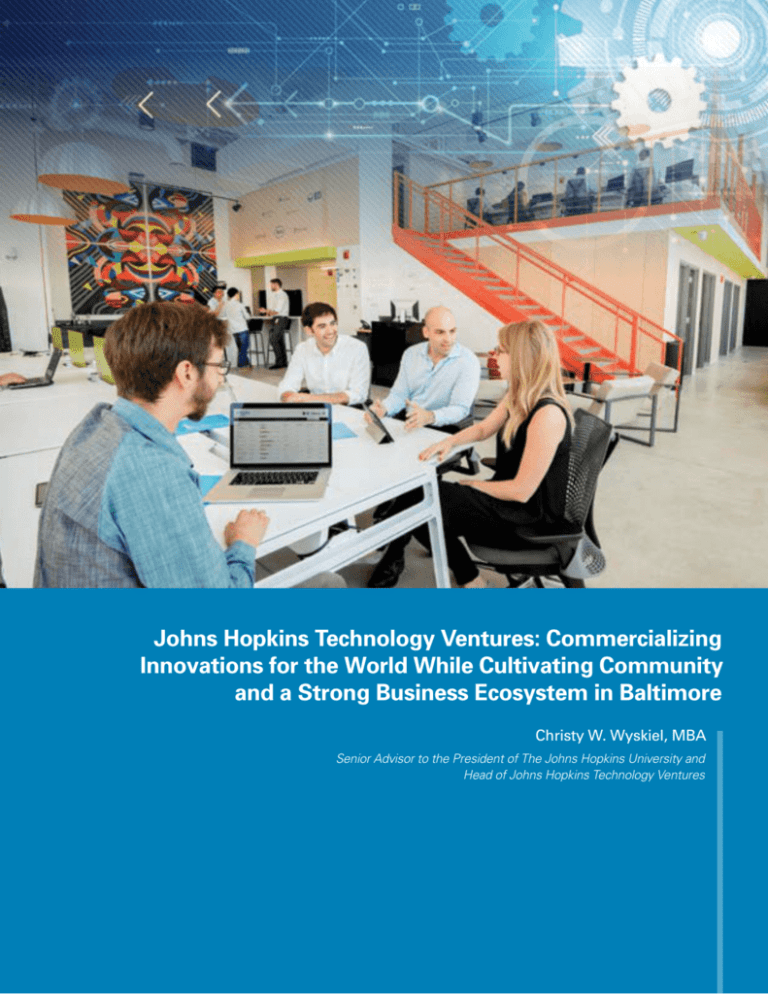
Johns Hopkins Technology Ventures: Commercializing Innovations for the World While Cultivating Community and a Strong Business Ecosystem in Baltimore Christy W. Wyskiel, MBA Senior Advisor to the President of The Johns Hopkins University and Head of Johns Hopkins Technology Ventures Every day at Johns Hopkins Technology Ventures (JHTV), we work to make Baltimore a great place for innovation — for researchers in the lab, students in dorm rooms and nascent startup companies just getting off the ground. We feel Baltimore has it all: affordability; world-class research institutions; proximity to established technology hubs like Boston and Washington, D.C.; and increasing interest from investors like Steve Case, who started his fall 2015 Rise of the Rest tour, a nationwide tour of cities with great startup potential, right here in Baltimore. Steve Case believes Baltimore has a bright future as a major hub of innovation, and so do we. The mission of our team at JHTV is to steward innovations and discoveries made across the university from lab to market. We help researchers commercialize technologies with the potential to improve lives all over the world — from new drugs to more accurate medical devices, precision screening technologies and so much more. In fiscal year 2015, JHTV received a record 516 invention disclosures from Johns Hopkins researchers, and the office stewarded 16 startups through the incorporation process. Given Johns Hopkins has received more federal research funding than any other institution in the country for 35 years in a row, these numbers aren’t surprising. But our mission expands beyond the Johns Hopkins community. We believe we have the potential to make a significant impact on economic development in Baltimore. By fostering conditions that support the growth of startups, encourage outside capital investment, and attract and retain top talent, we can nurture an environment that promotes organic growth of new industries and creates jobs. These innovative startups can transform Baltimore into a top technology city, with more jobs at all skill levels, reinvigorated communities and rejuvenated neighborhoods — places for all Baltimoreans to grow and thrive. How Are We Organized? JHTV is an intellectual property administration center for Johns Hopkins that serves researchers and inventors affiliated with the university. We offer a licensing, patent and technology commercialization office to help inventors and entrepreneurs protect and license their innovations. We also foster collaboration with business partners who specialize in launching new inventions and we support startup companies formed at the university. Our team recently reorganized itself to focus on our objectives and improve our customer service not only for the faculty, students and staff members we serve at the university, but also for our industry, venture capital and foundation partners. Our group is organized into three areas: 1. Technology transfer: When faculty, students and staff members disclose inventions to our team, we help them determine the best path forward, from intellectual property protection and patenting to commercialization and licensing. 2. Corporate partnerships: We facilitate industry funding for faculty members to pursue research projects with high commercial potential. One recent example is a five-year collaboration agreement to jointly develop 2 0 1 6 B A LT I M O R E B U S I N E S S R E V I E W 25 doing ever since — addressing these critical needs identified in the report: n he need for affordable, flexible space, particularly T lab space nT he need for funding — both early-stage translational funding to get newly formed teams past the so-called valley of death, in which many startups flounder without adequate funding, and later-stage capital to ensure our startups in a position to take institutional funding have the option to stay in town instead of leaving to follow the money to San Francisco, Boston or elsewhere. nT he right kinds of services — such as mentoring, educational programming, startup acceleration, and legal and accounting advice — in place to support entrepreneurs and innovation. FastForward Homewood innovation hub under construction ophthalmic therapies targeting retinal diseases with global biopharmaceutical company Bayer HealthCare. 3. FastForward: Our FastForward program supports the development of startups from the university and beyond — companies can apply to FastForward even if they’re not affiliated with the university — by providing education, mentorship, funding and space at our FastForward Homewood and FastForward East innovation hubs. FastForward has new leadership and a team that’s ready to help startups, from developing a concept to obtaining institutional funding. How Will We Accomplish Our Goals? Two years ago, when I had the privilege of joining the JHTV team at Johns Hopkins, we formed a committee to examine what it would take to create a fully developed innovation ecosystem at the university and in Baltimore. This committee was led by two of our most innovative faculty members, Drew Pardoll, director of Johns Hopkins’ Cancer Immunology Program and a professor of oncology, and Jennifer Elisseeff, director of Johns Hopkins’ Translational Tissue Engineering Center and a professor of biomedical engineering and ophthalmology. We toured the country examining best practices at other academic and research institutions to uncover key characteristics of localities like Cambridge, Massachusetts, and San Diego, California, where commercialization thrives. The committee’s findings provided a prescriptive road map for our team to follow in developing our own innovation ecosystem, and that is what we have been 26 2 0 1 6 B A LT I M O R E B U S I N E S S R E V I E W Space One of the biggest challenges for any entrepreneur — especially in the life sciences — is finding affordable, flexible space in close proximity to other like-minded innovators and researchers. We are addressing this pain point head-on with two FastForward innovation hubs — and a third under construction at 1812 Ashland Ave. FastForward Homewood, near our schools of arts and sciences and engineering, opened in 2014, while FastForward East, near our schools of medicine, nursing and public health, opened in early 2015. Both offer co-working and dedicated office space as well as dedicated and shared wet lab space with affordable and flexible lease terms, and both are at capacity. Our new space at 1812 Ashland will open in the fall of 2016 providing a marquis location for all manner of startup activity – from work space (lab, office and co-working) to event and educational space – and at 25,000 square feet will be our largest innovation hub to date. Funding Our team is seeking to address the acute need for translational funds in several ways. Thanks to a philanthropic gift, we recently established the $5.4 million Louis B. Thalheimer Fund for Translational Research for promising technologies at the university. We are also working closely with innovative teams across the university to uncover ideas eligible for translational grant funding from the state through the Maryland Innovation Initiative (MII) administered by the Technology Development Corporation. In fiscal year 2015 alone, 26 different Johns Hopkins projects with commercial potential received more than $2.6 million in MII funding. This year, along with other partners in town, we supported the DreamIt Health Baltimore accelerator program, which provided capital and intensive training to promising health information technology companies in Baltimore for the second year in a row. Additionally, we work regularly with local and outside angel, corporate and venture investors to identify startups and ideas worthy of investment consideration. Services We know innovators need more than just space and money — they also need the right kind of support services to help smooth the path forward to commercialization. Over the past 18 months, we’ve put in place an array of services, including a new Mentor-inResidence Program, an express license for startups, a new pro bono legal program and an entrepreneurial boot camp, and we continue to develop more. In just one year, our Mentor-in-Residence Program has more than doubled the number of exited entrepreneurs and investors working tirelessly to support our startups by providing them with guidance, support and introductions. And startups are thrilled with the new pro bono legal incorporation services provided by four local firms committed to developing Baltimore’s entrepreneurial ecosystem. We Believe In Connecting And Building To make our dreams of a new innovation economy in Baltimore a reality, we’ve participated in or sponsored a number of events to ensure collaboration across Baltimore. Every year, we co-host an event with the University of Maryland, Baltimore, that showcases early technologies in development at the two universities to members of the Johns Hopkins Alliance for Science and Technology Development and the University of Maryland, Baltimore, Commercial Advisory Board. These two groups include investors and industry partners interested in hearing from faculty members, researchers and startups about the latest technologies being created. We took part in planning Steve Case’s visit to Baltimore during his September Rise of the Rest tour. We worked closely with our friends at Betamore, Under Armour, Impact Hub and Startup Maryland to ensure our city would shine under the national spotlight. What Does The Future Look Like? Based on some of the successes we are seeing with the startups we’re supporting, I believe the future looks really bright. Just this past fall, for example, Personal Genome Diagnostics (PGDx), a Johns Hopkins startup providing cancer genome testing products and services, announced completion of a $21 million Series A funding round led by New Enterprise Associates. PGDx has already created 63 jobs in Baltimore and plans to add many more as it builds out its location in Canton. Or take Emocha, a startup that provides a mobile health platform that streamlines the continuum of care. Emocha recently doubled the amount of space it’s renting in our FastForward East innovation hub to accommodate its own job growth fueled by recent investment and revenue growth. These are just two of many examples that get me excited to come to work every day. I am in constant awe of the amazing array of groundbreaking technologies in development right here in Baltimore. These technologies have the potential to change the world — and to impact the future of Baltimore by providing jobs, growth and hope. To learn more about our team, the exciting technologies we are creating and ways to get involved, please check out our website http://ventures.jhu.edu/ or check us out on twitter (@JHTechVentures) or Facebook (https:// www.facebook.com/pages/Johns-Hopkins-TechnologyTransfer/334108406671886) This year, we also joined forces with Greenspring Associates, a local venture capital firm, for the first University Technology Day. Twenty-four Johns Hopkins startups pitched their technologies to a dream audience of possible funders, including angel and venture capital investors from around the country. The next event will take place in April 2016. 2 0 1 6 B A LT I M O R E B U S I N E S S R E V I E W 27
